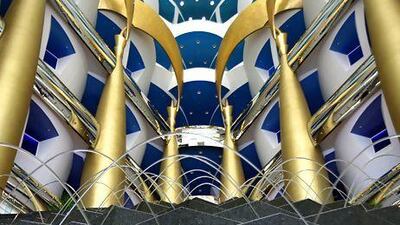Economy hotel operators are planning to increase the number of rooms in Dubai as the emirate seeks to broaden its appeal as a tourist destination.
While Dubai has garnered fame for its luxury hotels - such as the Burj Al Arab in Jumeirah - options for travellers on more modest budgets have until now been somewhat thin on the ground.
The Dubai Government recently said it wanted to double the number of tourists visiting each year to 20 million by 2020. To meet this goal, the emirate will have to bring in tourists on a tighter budget than the big spenders who have typically visited.
Accor is currently the biggest provider of budget rooms in the Arabian Gulf, said Christophe Landais, the group's managing director for the Middle East. It operates 12 Ibis hotels in the economy category and 12 Novotels in the mid-range category. Accor will open five more Ibis and six more Novotel hotels before 2015.
"In the past, there really was a gap between the luxury upscale hotels and the unbranded local hotels," Mr Landais said. "Ibis and Novotel have been quite successful in filling that gap. But as for economy options, we are very low at the moment [in Dubai]. There is room for the development of international branded hotels. There needs to be the right mix of economy, mid-scale and luxury hotels."
Dubai currently has the world's highest revenue per available room, a key industry measure, at US$356.98.
At Novotel's newest property in Dubai's Al Barsha area the opening rates started at Dh350.
Seventy per cent of Ibis's guests are from the GCC and the Levant.
Citymax Hotels, which operates three-star properties (considered to be in the economy category), plans to grow its presence in the UAE in the next five years as it bets on the arrival of more modest-spending tourists.
Dubai is currently well served by five-star and deluxe properties and there is unlikely to be much opportunity for growth in that category, according to Russel Sharpe, the chief operating officer of Landmark Hospitality, the parent company of Citymax Hotels. But there is "huge potential" in other areas of the market, he said.
Citymax currently operates three hotels in the UAE - two in Dubai and one in Sharjah - for a total of 1,350 rooms. In the next five years it plans to add three more hotels in Dubai: in Deira, Business Bay and Tecom.
"This will be a platform to go further afield ... into Saudi Arabia, Qatar, Bahrain and Oman," Mr Sharpe said.
The number of rooms will almost triple to 5,000 in the next five years across the GCC.
Citymax's guests typically come from Russia and the former Soviet Union, China and India. More recently, it has won new business from South Korean visitors.
Mr Sharpe said to meet its 2020 target, Dubai should also focus on building many more family attractions, such as the Global Village. The opening of the Dubai World Central airport will also increase the potential for more low-cost and charter airlines to operate, another important element of the strategy.
Rudi Jagersbacher, Hilton's regional president, is also eyeing the budget market, especially for those on a quick layover in Dubai.
"The transit market, where people stop and move on, has become a key market," he said. "The difference between full service and limited service is where the opportunity is - in the affordable stay."
He also noted the importance of the increasing number of visitors using budget airlines.
"Some of the budget carriers popping up I find very interesting," he said. "That is increasing the volume of visitors."
Flydubai expects to carry 6 million passengers this year, the Dubai Media Office tweeted recently, citing the budget airline's chief executive Ghaith Al Ghaith.

